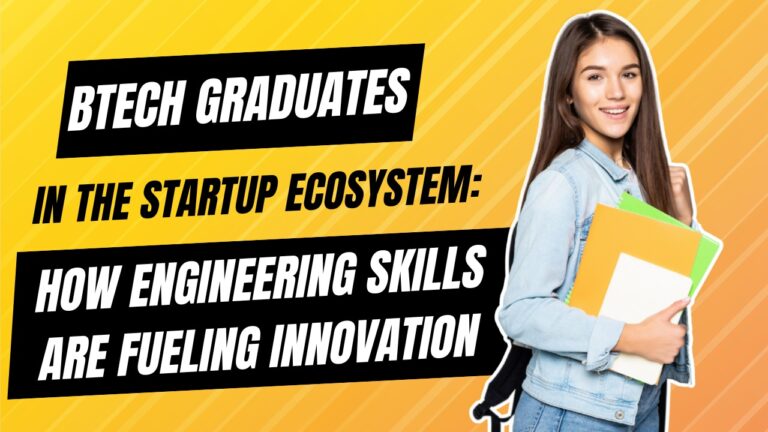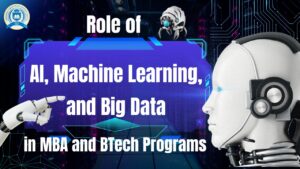
Imagine leading the next tech revolution—not just by building cutting-edge software, but also by strategically scaling it into a global...

Imagine leading the next tech revolution—not just by building cutting-edge software, but also by strategically scaling it into a global...

What do Flipkart, Ola, and Zerodha have in common? Apart from being some of India’s most successful startups, they were...

When we think of healthcare, we usually picture doctors, nurses, and medical equipment. But behind every successful hospital or healthcare...

Are you a BTech graduate wondering what’s next? You’re not alone. Every year, thousands of engineering students find themselves asking...

Imagine a computer so powerful it can solve problems in seconds that would take traditional supercomputers years. Sounds like science...

Imagine leading the next tech revolution—not just by building cutting-edge software, but also by strategically scaling it into a global product. Sounds exciting, right? Welcome to the evolving world of work, where the fusion of engineering and management skills is setting new benchmarks in innovation. As industries transform at breakneck

What do Flipkart, Ola, and Zerodha have in common? Apart from being some of India’s most successful startups, they were all co-founded by engineering graduates. The startup wave isn’t just about business ideas—it’s about problem-solving, technical execution, and innovative thinking, all of which are deeply rooted in engineering education. Today,

When we think of healthcare, we usually picture doctors, nurses, and medical equipment. But behind every successful hospital or healthcare startup is a team of professionals ensuring that everything runs smoothly—from budgeting and operations to policy decisions and strategic growth. That’s where the MBA in Healthcare Management steps in. If

Are you a BTech graduate wondering what’s next? You’re not alone. Every year, thousands of engineering students find themselves asking the same question: Should I stick to the technical path, or branch out into management? Increasingly, the answer is pointing toward an MBA. In fact, the fusion of technical skills

Imagine a computer so powerful it can solve problems in seconds that would take traditional supercomputers years. Sounds like science fiction, right? Welcome to the world of quantum computing—a technology that’s no longer in the distant future but fast becoming a present-day reality. If you’re a BTech student, you have

Choosing the right specialization can be a game-changer in your academic and professional journey. Whether you’re stepping into a Bachelor of Technology (BTech) program or planning your next big move with a Master of Business Administration (MBA), specialization is where your personal interests and career aspirations align. So, how do

In today’s fast-paced digital world, the fusion of technology with education is revolutionizing how we learn and what we learn. Artificial Intelligence (AI), Machine Learning (ML), and Big Data are no longer buzzwords confined to tech companies—they are now integral parts of modern MBA and BTech programs, especially those offered

In today’s dynamic global economy, entrepreneurship isn’t just a buzzword—it’s a career path. From tech startups to social enterprises, more professionals are choosing to build their own businesses instead of climbing traditional corporate ladders. And with the growing popularity of the Entrepreneurship MBA, aspiring founders now have access to structured,

The world of financial technology—or fintech—is transforming how we manage money, make payments, invest, and even get loans. As the industry rapidly evolves with innovations like blockchain, robo-advisors, AI-driven analytics, and decentralized finance (DeFi), there’s one thing in high demand: leaders who understand both finance and technology. This is where

In today’s competitive business environment, earning an MBA isn’t just about mastering finance, marketing, or strategy—it’s also about becoming a transformative leader. As more students turn to online MBA programs and distance learning MBA degrees for flexibility and convenience, the development of leadership skills within these programs has become essential.

Imagine leading the next tech revolution—not just by building cutting-edge software, but also by strategically scaling it into a global product. Sounds exciting, right? Welcome to the evolving world of work, where the fusion of engineering and management skills is setting new benchmarks in innovation. As industries transform at breakneck speed, the blend of BTech (Bachelor of Technology) and MBA (Master of Business Administration) has become one of the most powerful combinations to thrive in today’s hybrid economy. In this blog, we explore how these two degrees—when combined—are not just creating better professionals, but also driving disruptive innovation in technology and business. Whether you’re a student, a working professional, or an aspiring entrepreneur, understanding this synergy can shape your future in ways you never imagined. The Evolving Workplace—A Perfect Storm of Tech and Strategy The future of work is no longer about choosing between tech and business—it’s about integrating both. Rapid advancements in AI, automation, data analytics, and blockchain are changing the way companies operate, hire, and scale. At the same time, organizations need leaders who can understand how technology intersects with business goals, consumer needs, and market dynamics. Interesting Fact: According to a World Economic Forum (WEF) 2023 report, by 2027, over 50% of all workers will need to upskill or reskill to remain relevant. The report also highlights that roles combining tech and business acumen are expected to be among the fastest growing. Why BTech + MBA is the Power Combo of the Future 1. Tech-Driven Decision Making A BTech degree teaches the fundamentals of engineering, system design, and technical problem-solving. Pair that with the strategic thinking, leadership, and financial acumen of an MBA, and you get professionals capable of making data-backed, tech-informed decisions at the leadership level. 2. Versatility Across Industries Whether it’s fintech, healthtech, edtech, e-commerce, or supply chain, companies want leaders who understand both the technology stack and the business model. A BTech + MBA profile fits perfectly across these verticals. 3. Startup and Entrepreneurial Edge From Flipkart to Ola, India’s startup ecosystem is full of engineers who used their tech background to solve a real-world problem—and then used business skills to scale. An MBA gives BTech graduates the vision, funding knowledge, and market insight needed to transform a prototype into a profitable enterprise. Real-World Impact—Case Studies of Tech-Business Innovators These aren’t isolated examples. They reflect a larger trend of engineers evolving into business leaders, driving transformation at scale. Rise of Dual-Skilled Professionals Employers are actively seeking professionals who can bridge the gap between IT teams and executive boards. In fact, a 2023 LinkedIn report showed a 46% increase in job postings demanding cross-functional expertise—especially roles like: With hybrid roles becoming more mainstream, a single-skill approach is no longer enough. Top MBA Specializations for BTech Graduates If you’re a BTech grad considering an MBA, choosing the right specialization is crucial. Here are the top trending ones aligned with future work roles: Way Forward—Preparing for the Future of Work So, how can students and professionals future-proof themselves? Conclusion As we enter the era of intelligent automation, global connectivity, and digital disruption, companies aren’t just looking for coders or strategists—they’re seeking leaders who can do both. A BTech + MBA combo is no longer just a career move; it’s a strategic advantage in a future defined by innovation, collaboration, and continuous evolution. So, if you’re on the fence about blending tech and business education, remember: the future of work belongs to those who can innovate, integrate, and lead.

What do Flipkart, Ola, and Zerodha have in common? Apart from being some of India’s most successful startups, they were all co-founded by engineering graduates. The startup wave isn’t just about business ideas—it’s about problem-solving, technical execution, and innovative thinking, all of which are deeply rooted in engineering education. Today, BTech graduates are emerging as key players in the startup ecosystem, not just as tech leads, but as founders, product architects, and innovation drivers. Whether it’s fintech, edtech, healthtech, or AI-based platforms, engineers are powering India’s new-age economy. Let’s explore how and why BTech graduates are reshaping the startup landscape—one breakthrough at a time. Why Startups Love Engineering Talent Startups thrive on building innovative solutions quickly and efficiently—and that’s exactly where engineers shine. With their training in analytical thinking, coding, system design, and technology integration, BTech graduates bring the core skill sets startups need to survive and scale. Key Advantages Engineers Bring to Startups: According to a 2023 report by Nasscom, over 48% of Indian startup founders have an engineering background—proving that BTech grads are not just supporting innovation but leading it. Top Domains Where Engineers Are Making a Mark While engineering skills are applicable across sectors, some startup domains are particularly ripe for tech-driven disruption: 1. Fintech From payment gateways to robo-advisors, engineers are building scalable platforms that are transforming how India transacts. Startups like PhonePe, Razorpay, and Groww are led by tech-focused teams. 2. EdTech Engineering minds have built platforms like BYJU’S, Unacademy, and Vedantu, revolutionizing learning experiences using AI, gamification, and interactive UX. 3. HealthTech Startups such as Practo and 1mg are combining data science with healthcare delivery—often led by engineers turned entrepreneurs. 4. AI and Machine Learning Fields like natural language processing, predictive analytics, and computer vision rely heavily on engineering know-how, making BTech grads the perfect fit. From Employee to Entrepreneur—The BTech Startup Journey Many engineers begin their journey as developers or product managers in startups. Over time, exposure to business models, user behavior, and product-market fit often ignites an entrepreneurial spark. Common Steps on This Journey: A 2023 Inc42 report noted that over 35% of tech startups in India were bootstrapped by engineering founders who coded their own MVPs before raising any capital. How Colleges Are Encouraging Startup Culture Among BTech Students The entrepreneurial spirit is growing right on campus. Many top engineering colleges now offer: Even Tier-2 and Tier-3 colleges are establishing entrepreneurship development cells (EDCs) to encourage startup ideas and connect students with angel networks and accelerators. Success Stories of BTech Graduates in Startups These examples show that engineering knowledge, when combined with a vision, can build billion-dollar businesses. Conclusion In today’s fast-paced startup ecosystem, engineering skills are no longer confined to the back end. BTech graduates are leading innovation, driving strategy, and redefining industries through their startups. Whether you dream of founding your own venture or joining an ambitious young company, your engineering background is a solid launchpad. So if you’re a BTech student or graduate asking “What’s next?”, remember: Your skills can fuel innovation, solve global problems, and maybe even build the next unicorn.

When we think of healthcare, we usually picture doctors, nurses, and medical equipment. But behind every successful hospital or healthcare startup is a team of professionals ensuring that everything runs smoothly—from budgeting and operations to policy decisions and strategic growth. That’s where the MBA in Healthcare Management steps in. If you’ve ever wanted to be part of transforming the healthcare sector without being a medical professional, this could be your calling. With rising demands for better healthcare infrastructure, skilled healthcare managers are now more essential than ever. According to the U.S. Bureau of Labor Statistics, jobs in medical and health services management are projected to grow by 28% from 2022 to 2032, much faster than the average across industries. Clearly, healthcare isn’t just about saving lives—it’s also about managing systems, people, and innovations. And that’s what an MBA in Healthcare Management empowers you to do. What is an MBA in Healthcare Management? An MBA in Healthcare Management is a specialized program that combines traditional business disciplines—like finance, marketing, HR, and operations—with core healthcare knowledge. This includes hospital administration, healthcare policy, patient services, and medical ethics. The goal? To create healthcare leaders who understand both the language of medicine and the metrics of business. Whether you’re aiming to manage hospitals, work in health insurance, lead public health initiatives, or join healthcare startups, this program prepares you to navigate the complexity of a rapidly evolving sector. Why is Healthcare Management So Critical Today? The healthcare industry is undergoing a massive transformation—fueled by technology, increased life expectancy, pandemics, and shifting patient expectations. Here’s why the demand for skilled managers in this field is surging: According to IBEF (India Brand Equity Foundation), the Indian healthcare market is expected to reach $638 billion by 2025, making it one of the fastest-growing sectors. The opportunity for impactful leadership has never been greater. Skills You’ll Gain with an MBA in Healthcare Management This program doesn’t just offer knowledge—it equips you with practical, job-ready skills, such as: These skills are critical in helping organizations improve patient outcomes, reduce costs, and stay compliant with government regulations. Career Opportunities After MBA in Healthcare Management This MBA opens doors across multiple segments of the healthcare industry: Career Role Description Hospital Administrator Oversee daily operations of hospitals and clinics. Healthcare Consultant Advise organizations on strategy, operations, and performance improvement. Health Policy Analyst Work with government bodies and NGOs to shape public health policy. Pharmaceutical Project Manager Lead marketing or R&D initiatives for pharma companies. Medical Practice Manager Manage finances and operations for small to mid-sized clinics. Health Insurance Manager Handle product design, underwriting, and claims management. In India, average salaries after this MBA range between ₹6–15 LPA, while globally, it can exceed $100,000 annually, especially in countries like the U.S., U.K., and Canada. Top Institutes Offering MBA in Healthcare Management Some of the leading institutions offering this specialization include: Many of these also offer distance learning and online MBA options, perfect for working professionals. Is This the Right Fit for You? This program is ideal for: If you have a passion for improving lives and a knack for solving complex business problems, this path offers a meaningful, lucrative, and future-proof career. Conclusion: Healthcare Needs Leaders, Not Just Doctors The healthcare sector is more than clinics and ICUs—it’s a vast, dynamic industry that needs visionary managers. An MBA in Healthcare Management equips you with the tools to make real change—be it in patient care, medical innovation, policy-making, or health entrepreneurship. In a world where healthcare challenges are becoming more complex, business-savvy healthcare professionals can drive innovation, efficiency, and impact. If you’re looking to make a difference—not just earn a paycheck—this might just be your ideal path.

Are you a BTech graduate wondering what’s next? You’re not alone. Every year, thousands of engineering students find themselves asking the same question: Should I stick to the technical path, or branch out into management? Increasingly, the answer is pointing toward an MBA. In fact, the fusion of technical skills with business acumen is turning into a powerful combination—and companies love it. According to a 2023 report by the Graduate Management Admission Council (GMAC), over 18% of MBA applicants worldwide come from an engineering background, and in India, this number is even higher. This trend raises an important question: Why are BTech graduates turning to MBA programs in droves? Let’s explore the reasons behind this career shift and how it’s helping engineers rise faster and go further in their careers. Growing Appeal of an MBA for Engineers While a BTech degree equips students with strong technical skills, today’s job market demands more than just coding, design, or development capabilities. Companies are looking for professionals who understand both the technical and strategic aspects of a business. Key Reasons Driving the Shift: Real-World Examples and Success Stories Think about some of the most successful tech entrepreneurs—many of them hold engineering degrees followed by MBAs. Sundar Pichai (Google CEO) holds a BTech in Metallurgical Engineering from IIT Kharagpur and later pursued an MBA from Wharton. Similarly, Satya Nadella (Microsoft CEO) started as an electrical engineer before obtaining his MBA, which equipped him with the strategic mindset to lead one of the world’s biggest tech firms. These stories aren’t just inspiring—they also highlight the real-world impact of combining engineering and management skills. What Specializations Are BTech Graduates Choosing in MBA? MBA offers a wide array of specializations, but certain fields particularly attract BTech grads due to their compatibility with technical skills: Competitive Edge in the Job Market A BTech-MBA combo makes candidates highly versatile and attractive to recruiters. Employers value professionals who can bridge the gap between technical teams and business stakeholders. Whether it’s a startup or a multinational company, this hybrid skill set is increasingly in demand. Trending Roles for BTech + MBA Graduates: In fact, LinkedIn’s 2023 Emerging Jobs Report listed Product Management and Business Analytics among the top 10 roles being filled by tech-MBA professionals. Should You Go for MBA Right After BTech or Gain Work Experience? This is a common dilemma. While many pursue an MBA immediately after engineering, others prefer to gain 1–2 years of work experience first. Pros of Immediate MBA: Pros of MBA After Experience: The choice ultimately depends on your goals, financial readiness, and the kind of roles you aspire to. Conclusion: Engineering Your Way to the Boardroom The trend is clear: More and more BTech graduates are opting for MBAs to accelerate their career trajectories. This move is not just about earning more—it’s about creating impact, leading teams, launching ventures, and driving innovation from the front. If you’re a BTech student or graduate contemplating your next step, ask yourself: Do I want to only build technology, or also drive the decisions behind it? If the latter excites you, an MBA might just be your perfect launchpad.

Imagine a computer so powerful it can solve problems in seconds that would take traditional supercomputers years. Sounds like science fiction, right? Welcome to the world of quantum computing—a technology that’s no longer in the distant future but fast becoming a present-day reality. If you’re a BTech student, you have a front-row seat to this tech revolution. But the question is: are you preparing yourself to be part of this breakthrough? In this blog, we’ll explore what quantum computing is, why it matters, and most importantly, how BTech students like you can gear up for a future in this transformative field. Whether you’re in computer science, electronics, or even mechanical engineering, quantum computing has something big in store for everyone. What is Quantum Computing and Why Is It a Game-Changer? Unlike classical computers that process data in binary (0s and 1s), quantum computers use qubits, which can represent 0 and 1 simultaneously thanks to the principle of superposition. Add in entanglement and quantum tunneling, and you have a machine capable of solving incredibly complex problems. Real-World Impact: According to a 2024 McKinsey report, the quantum computing market could surpass $90 billion by 2040, and over 5,000 jobs in quantum tech were listed globally in 2023 alone. Why BTech Students Need to Pay Attention As industries begin to adopt quantum technologies, the demand for skilled professionals is surging. Companies like IBM, Google, Microsoft, and Amazon are heavily investing in quantum research. For BTech students, this is not just an academic trend—it’s a career-defining opportunity. Key Skills BTech Students Should Master 1. Quantum Physics Fundamentals Start with the basics: superposition, entanglement, and quantum gates. Free resources like MIT OpenCourseWare or NPTEL offer beginner-level lectures tailored for engineering students. 2. Linear Algebra and Probability Theory Quantum algorithms rely heavily on matrix operations and probability. A solid grasp of these concepts is essential. 3. Programming Languages for Quantum Development Languages like: Learning these gives you hands-on experience in writing quantum algorithms and simulating quantum circuits. 4. Cloud-Based Quantum Platforms You don’t need a quantum computer at home to start experimenting. Platforms like: It offer free or low-cost access to real quantum hardware and simulators. Recommended Courses and Certifications These courses not only strengthen your resume but also connect you with a global community of learners and professionals in the field. How Colleges Are Integrating Quantum Tech into BTech Programs In India and globally, top institutions are updating their BTech curricula. For example: As a student, actively enrolling in these electives or online programs can set you apart from your peers.Internships and Research Opportunities Explore internships with: Check platforms like Internshala, LinkedIn, and AngelList regularly for openings. Early exposure will give you a competitive edge when applying for full-time roles. Building a Quantum-Ready Portfolio Start small: Having a visible online presence shows recruiters your passion and initiative. Final Thoughts: Embrace the Uncertainty—Quantum Style! The future is uncertain—and in quantum terms, that’s a good thing! As a BTech student, this is your chance to be part of something revolutionary. By building your foundation now, you’ll be ready to ride the wave as quantum computing moves from research labs to real-world applications. The quantum era is coming. Will you be ready to code the future?

Choosing the right specialization can be a game-changer in your academic and professional journey. Whether you’re stepping into a Bachelor of Technology (BTech) program or planning your next big move with a Master of Business Administration (MBA), specialization is where your personal interests and career aspirations align. So, how do you choose the “best” specialization? Let’s dive in and explore the most in-demand MBA and BTech specializations, backed by recent data, to help you decide which one could be the ideal fit for you. Why Choosing the Right Specialization Matters In today’s competitive job market, a generic degree often isn’t enough. Specializations help you stand out, increase your earning potential, and offer focused career opportunities in your area of interest. According to a 2024 Naukri.com survey, over 72% of recruiters prefer candidates who hold a specialization aligned with the role. This trend is only growing as industries become more specialized and data-driven. Top Specializations in MBA 1. MBA in Marketing If you enjoy consumer psychology, brand building, and digital trends, marketing is for you. 2. MBA in Finance Perfect for number crunchers and analytical thinkers. 3. MBA in Human Resources (HR) If you’re a people person and passionate about organizational culture, HR could be your calling. 4. MBA in Business Analytics With the rise of data, this tech-driven MBA specialization is booming. 5. MBA in Operations Management Ideal for those who like managing logistics, systems, and supply chains. Top Specializations in BTech 1. Computer Science Engineering (CSE) This continues to be the most sought-after specialization in BTech. ✅ Fact: As per AIM Research 2024, India will need over 1 million AI professionals by 2026. 2. Electronics and Communication Engineering (ECE) A blend of hardware and software tech—great for telecom and embedded systems. 3. Mechanical Engineering Timeless and versatile, this is ideal for students who enjoy machine design and manufacturing. 4. Civil Engineering If you’re passionate about infrastructure, planning, and sustainability, civil is for you. 5. Information Technology (IT) Closely related to CSE but focuses more on IT infrastructure, networking, and databases. MBA vs BTech: Which Specialization Is Right for You? Criteria MBA BTech Best for Graduates with 1–2 years of work experience 12th-pass students (Science stream) Focus Area Business, Management, Leadership Technology, Engineering, Innovation Duration 2 years 4 years Career Outcome Managerial roles Technical or Core Engineering roles Final Thoughts The “best” specialization is the one that aligns with your strengths, interests, and long-term goals. Don’t just follow trends—follow your passion backed by practical scope. Do thorough research, speak to industry experts, and evaluate future industry demands. Whether you choose an MBA in Business Analytics or a BTech in Computer Science, the key to success lies in mastery, adaptability, and continuous learning.

In today’s fast-paced digital world, the fusion of technology with education is revolutionizing how we learn and what we learn. Artificial Intelligence (AI), Machine Learning (ML), and Big Data are no longer buzzwords confined to tech companies—they are now integral parts of modern MBA and BTech programs, especially those offered through distance learning platforms. Whether you’re an aspiring business leader or a future engineer, understanding how these technologies shape your education and career prospects is crucial. Let’s explore how AI, ML, and Big Data are transforming online MBA and distance BTech programs, making them more relevant, practical, and career-focused. Why AI, ML, and Big Data Matter in Higher Education Employers across all industries are looking for professionals who can understand and apply AI-driven insights, work with data, and lead tech-enabled transformation. As a result, top online MBA and BTech programs are evolving to embed these cutting-edge subjects into their curriculum. Here’s why this matters: By integrating AI and data science into the learning process itself, distance education is becoming more interactive, personalized, and impactful. AI and Big Data in Distance Learning MBA Programs Online MBA programs are no longer just about strategy, marketing, and finance—they’re about leading in a data-driven world. Here’s how AI and Big Data are shaping the modern MBA: 1. Smarter Learning with AI AI-powered platforms adapt the learning experience to each student’s pace and style. Through real-time feedback, personalized dashboards, and smart recommendations, flexible MBA courses are now more effective than ever. 2. Courses in Data-Driven Decision Making Many distance learning MBA programs now offer electives like: These courses teach future leaders how to interpret data, understand algorithms, and make informed decisions—essential skills in today’s digital economy. 3. Project-Based Learning with Real Datasets Using case studies and actual business datasets, MBA students can apply machine learning tools to solve real-world problems. This practical approach enhances problem-solving and strategic thinking. AI and ML in Distance Learning BTech Programs For BTech students, AI, ML, and Big Data aren’t just electives—they’re foundational pillars of modern engineering. 1. Core Curriculum Evolution Top distance learning BTech programs now include: These subjects are preparing students for in-demand roles like AI engineer, data scientist, and ML developer. 2. Practical Labs and Virtual Simulations Thanks to AI-enabled labs and virtual environments, students in online BTech courses can now run simulations, debug code, and analyze data without ever stepping into a physical lab. 3. Capstone Projects in Emerging Tech BTech students are encouraged to work on capstone projects involving real-world AI applications—such as building chatbots, predictive models, or even smart IoT systems using machine learning techniques. Benefits of Learning AI & Data Science Through Distance Education Choosing a distance learning program in MBA or BTech with a focus on AI, ML, or Big Data comes with powerful advantages: Most importantly, students gain job-ready skills that align with what the industry demands. Final Thoughts As AI, Machine Learning, and Big Data redefine industries, it’s essential for future business leaders and engineers to master these technologies. Whether you choose an online MBA with a focus on data-driven leadership or a distance learning BTech program in AI and analytics, you’re setting yourself up for a successful, future-proof career. The best part? With today’s flexible online education platforms, gaining these skills doesn’t require a campus. The classroom is wherever you are—and the future is just a few clicks away.

In today’s dynamic global economy, entrepreneurship isn’t just a buzzword—it’s a career path. From tech startups to social enterprises, more professionals are choosing to build their own businesses instead of climbing traditional corporate ladders. And with the growing popularity of the Entrepreneurship MBA, aspiring founders now have access to structured, skill-driven education that helps transform ideas into sustainable ventures. What’s even more exciting is the rise of distance learning MBA programs that offer this specialization. These online MBA in entrepreneurship courses are making it easier for working professionals, freelancers, and dreamers to gain the tools and confidence needed to launch successful businesses—without putting their lives on hold. Why Entrepreneurship MBA Is Booming Traditional MBAs have long focused on preparing students for roles in finance, consulting, or management. However, the global business environment has changed. Today’s professionals want more freedom, impact, and innovation—and entrepreneurship offers exactly that. Enter the Entrepreneurship MBA—a modern program tailored for those who want to: What makes this track even more accessible is the availability of flexible MBA courses online. Now, students can gain critical entrepreneurial skills while working full-time or running their side hustle. What You Learn in an Online MBA in Entrepreneurship Unlike general business degrees, an Entrepreneurship MBA focuses on building ventures from the ground up. Most distance learning MBA programs in this field include: Courses often include capstone projects, pitch presentations, and access to startup incubators or virtual mentorship programs. This practical exposure is crucial when turning ideas into viable business models. Benefits of a Distance Learning MBA in Entrepreneurship Whether you’re already working on a startup idea or just exploring possibilities, a distance MBA in entrepreneurship offers unmatched advantages: 1. Learn While You Launch Online programs are designed for flexibility. You can test your business ideas, run early-stage operations, and apply what you learn in real time. This “learn-by-doing” approach makes education more actionable and immediate. 2. Build a Global Network Most online MBA programs attract a diverse cohort of students and instructors from across the globe. This gives you access to international perspectives, future business partners, and potential investors—right from your laptop. 3. Low Risk, High Learning Instead of jumping into entrepreneurship blind, you get to test your strategy, refine your model, and make informed decisions backed by business theory and real-world case studies. It’s a safer, smarter way to build a startup. 4. Access to Mentors and Resources Top distance learning entrepreneurship programs partner with accelerators, investors, and seasoned entrepreneurs to provide mentorship and guidance. Some even help connect students with funding opportunities after graduation. How to Build Your Own Business After Graduation Earning an Entrepreneurship MBA is only the beginning. Here’s how to take your business from concept to reality post-graduation: Final Thoughts The rise of entrepreneurship-focused MBA programs, especially those offered through distance learning, reflects a growing shift in how professionals view their careers. Rather than waiting years to climb the corporate ladder, many are choosing to build something of their own—right now. With a strong foundation in business principles, leadership, and innovation, an online MBA in entrepreneurship gives you the freedom to dream, the structure to build, and the confidence to lead. If you’re ready to turn your ideas into impact, this might be the smartest investment you’ll ever make.

The world of financial technology—or fintech—is transforming how we manage money, make payments, invest, and even get loans. As the industry rapidly evolves with innovations like blockchain, robo-advisors, AI-driven analytics, and decentralized finance (DeFi), there’s one thing in high demand: leaders who understand both finance and technology. This is where an MBA in Finance, especially through distance learning programs, becomes a powerful tool. Whether you’re a finance professional looking to upskill or a tech enthusiast eager to transition into fintech leadership, earning a flexible online MBA in finance can help bridge the gap and fast-track your growth in this booming industry. Why Fintech Needs Financial Leaders Fintech isn’t just about coding and app development—it’s about revolutionizing financial systems and rethinking the customer experience. Companies need professionals who can: A distance learning MBA in finance equips future fintech leaders with these exact capabilities—plus the flexibility to learn while you earn. Benefits of an Online MBA in Finance for Fintech Aspirants Let’s break down how a distance learning MBA can make a real difference in your fintech journey. 1. Flexible Learning, Real-World Impact Enrolling in a flexible MBA course in finance allows working professionals to gain fintech-ready skills without pausing their careers. Whether you’re a banker, accountant, or entrepreneur, online programs let you apply classroom concepts directly to your work environment in real time. 2. Tech-Infused Curriculum Modern online MBA in finance programs are evolving to include core fintech concepts such as: This blend of traditional finance with emerging tech ensures you’re ready to lead in any fintech startup, investment firm, or digital banking venture. 3. Global Networking and Exposure Distance learning MBA programs often include students from various geographies and industries. This not only enriches your learning experience but also expands your professional network—critical in an interconnected industry like fintech. Many online MBA platforms host virtual events, guest lectures, and industry webinars that expose students to fintech leaders, venture capitalists, and innovation experts. 4. Leadership & Strategic Thinking Beyond financial theories and market analysis, MBA programs emphasize core leadership competencies: These skills are vital for fintech professionals tasked with disrupting traditional financial systems and scaling new technologies. What to Look for in a Fintech-Focused Distance MBA Program If you’re serious about becoming a leader in fintech through a distance learning MBA, here are some features to consider: Choosing the right online MBA in finance is just as important as the decision to pursue one. Focus on accredited institutions that combine academic rigor with digital learning innovation. Career Paths After an MBA in Finance for Fintech With an MBA in finance, you can pursue exciting leadership roles such as: Thanks to the flexibility of distance learning, you can explore these roles without having to relocate or take a break from your current job. Final Thoughts The fintech sector is rewriting the rules of finance, and the demand for agile, tech-savvy leaders is only growing. A well-structured online MBA in finance offers the perfect blend of financial expertise and business leadership to thrive in this space. Whether you’re aiming to launch your own fintech startup, climb the corporate ladder, or pivot into the digital economy, a distance learning MBA program can give you the skills, confidence, and credentials to lead the charge in fintech innovation.

In today’s competitive business environment, earning an MBA isn’t just about mastering finance, marketing, or strategy—it’s also about becoming a transformative leader. As more students turn to online MBA programs and distance learning MBA degrees for flexibility and convenience, the development of leadership skills within these programs has become essential. But why is leadership such a crucial part of the MBA journey, and how do distance learning education models foster this skill effectively? Let’s explore the growing importance of leadership in MBA programs and how it prepares students to thrive in modern workplaces. Why Leadership Matters in an MBA Program An MBA degree is often a stepping stone to management and executive-level roles. Whether you aim to lead a startup, manage cross-functional teams, or become a C-suite executive, strong leadership skills are vital. But leadership is not just about giving directions—it involves vision, empathy, decision-making, and the ability to inspire and influence others. Employers today are looking for graduates who can: By integrating leadership development into the core of their curriculum, **MBA programs—especially flexible MBA courses offered online—**help students become more than just managers. They become leaders ready to shape the future of business. How Distance Learning MBA Programs Build Leadership Skills Contrary to the outdated notion that online education lacks engagement, many distance learning MBA programs are specifically designed to build leadership in dynamic and interactive ways. Here’s how: 1. Collaborative Virtual Projects Many online MBA programs include group assignments, capstone projects, and real-time business simulations. These tasks foster essential leadership skills like communication, delegation, and strategic thinking in a digital environment—mirroring the realities of remote and hybrid workplaces. 2. Interactive Webinars and Case Studies Live sessions and case-based learning encourage critical thinking, ethical reasoning, and quick decision-making. Students are often placed in leadership roles during discussions, helping them practice leading under pressure. 3. Personalized Leadership Coaching Top distance learning MBA courses now offer access to career mentors, leadership coaches, and peer feedback systems. These resources help students identify their leadership style, improve soft skills, and develop emotional intelligence. 4. Global Networking and Diversity The global reach of online MBA programs means students interact with peers from different industries, cultures, and backgrounds. Leading in such a diverse environment helps sharpen intercultural competence and collaborative leadership abilities. Leadership as a Career Catalyst Building leadership capabilities during an MBA pays off in real-world outcomes. Graduates with strong leadership portfolios often land faster promotions, manage larger teams, and command higher salaries. In fact, leadership training is a major reason why professionals pursue an MBA, even via online or part-time formats. Moreover, as the business world adapts to automation, AI, and rapid change, the value of human-centered leadership—based on empathy, adaptability, and resilience—will only grow. MBA programs that highlight these competencies set their graduates apart in a saturated job market. Choosing the Right MBA Program for Leadership Development If you’re exploring online MBA programs or distance learning business degrees, prioritize institutions that: By doing so, you’ll ensure your MBA isn’t just a qualification—but a transformational experience. Final Thoughts The integration of leadership skills into distance learning MBA programs is not just a trend—it’s a necessity. As the world demands agile, empathetic, and forward-thinking leaders, MBA graduates must rise to the challenge. So, whether you’re a working professional aiming for your next career leap or a recent graduate looking to fast-track your growth, choose an MBA program that not only fits your schedule but also shapes your leadership potential. Because in today’s business world, leadership is not optional—it’s essential.
Shiksha Group of Institutions, established in 2009, is committed to transforming the landscape of education by making quality learning accessible and affordable for all. With a vision to empower aspiring students and enable them to achieve their dreams, ShikshaGroup offers world-class distance education programs tailored to meet diverse learning needs.
© 2023 Shiksha Group Of Institutions. All rights reserved.